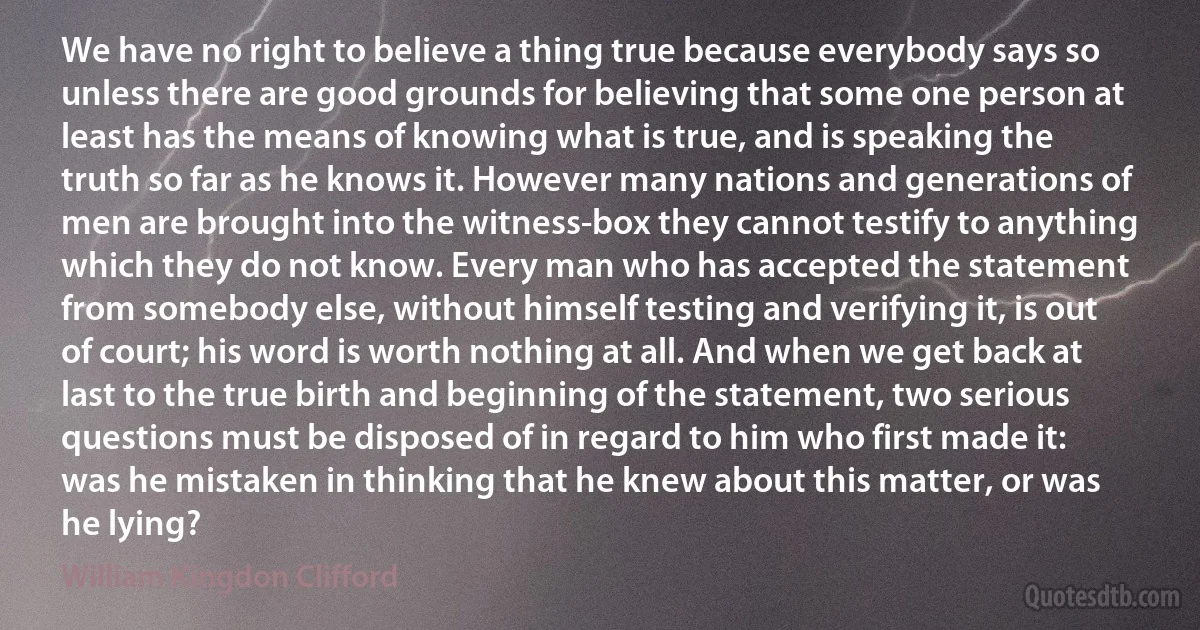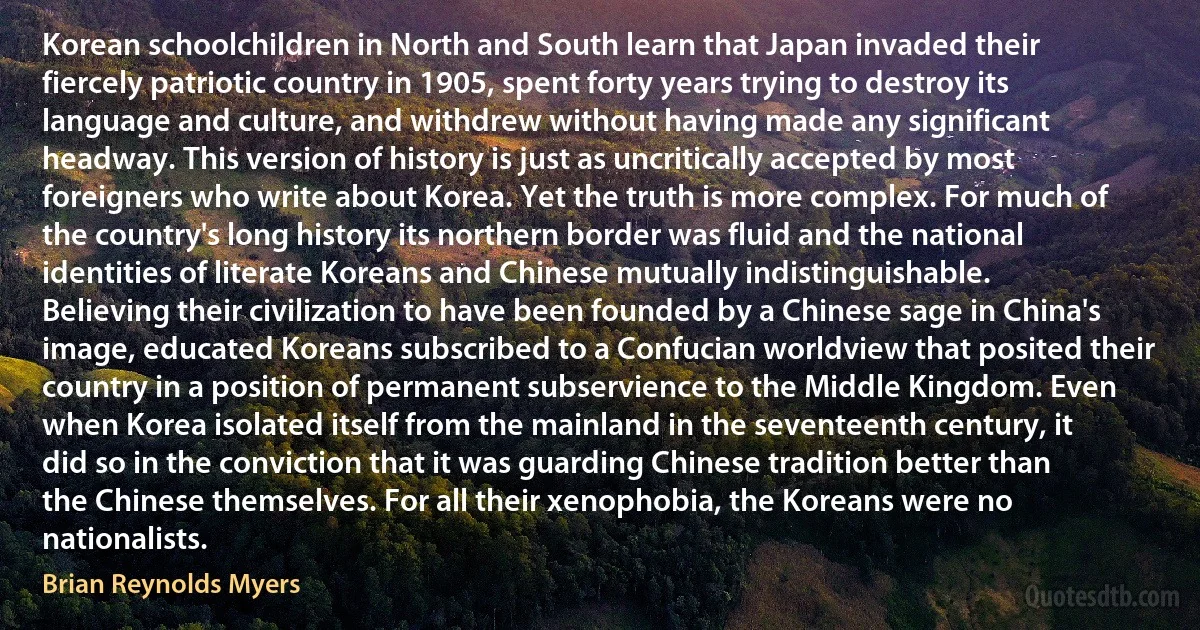Believing Quotes - page 34
We are not simple people who believe in happiness; nor weaklings who crumple to the ground in distress at the first reverse; nor skeptics observing the bloody effort of marching humanity from the lofty heights of a mocking, sterile wit. Believing in the fight, though we entertain no illusions about it, we are armed against every disappointment.

Nikos Kazantzakis
To me, believing that some correspondence intrinsically just is reference (not as a result of our operational and theoretical constraints, or our intentions, but as an ultimate metaphysical fact) amounts to a magical theory of reference. Reference itself becomes what Locke called a 'substantial form' (an entity which intrinsically belongs with a certain name) on such a view. Even if one is willing to contemplate such unexplainable metaphysical facts, the epistemological problems that accompany such a metaphysical view seem insuperable. For, assuming a world of mind- independent, discourse-independent entities (this is the presupposition of the view we are discussing), there are, as we have seen, many different 'correspondences' which represent possible or candidate reference relations (infinitely many, in fact, if there are infinitely many things in the universe).

Hilary Putnam
If it were up to me, I would not define myself by the absence of something; "theist" is a believer, so with "atheist" you're defining yourself by the absence of something. I think human beings work on yes, not on no. ... humanist is a great term. ...except that humanism sometimes is not seen as inclusive of spirituality. To me, spirituality is the opposite of religion. It's the belief that all living things share some value. So I would include the word spiritual just because it feels more inclusive to me. Native Americans do this when they offer thanks to Mother Earth and praise the interconnectedness of "the two-legged and the four, the feathered and the clawed,” and so on. It's lovely. ... because it's not about not believing. It's about rejecting a god who looks like the ruling class.

Gloria Steinem
Everything that happened to me has been a paradox for life. The very things that I should have done would have been the trap. The very things I might have given into, that demanded, that said, this is your life. I mean, this is your only way to survive, are the things I found hardest to end. 'Cause I believed in something else. You have to work like mad to make people understand... Even if I don't make it, you know, I really insist on believing, and then I fall off the edge because there's nobody else to follow it. And I would just fall off the edge.

Edie Sedgwick
These horrible affairs in France are the offspring of fanaticism. Yes, sir; if the reformation had taken place there, as well as here, religion and the clergy would have been respected, as they are here. Fanatics make atheists. If I cannot believe in God without believing that a wafer is God, my reason abjures the deity. I wish religion to exist: it is of infinite use to society, and I therefore wish it to be as rational as possible. A synod of the English church might order several objectionable tenets and expressions of our worship to be altered. I love those reformations that prevent revolutions, by keeping pace with the gradual progress of reason and knowledge.

Horace Walpole
In addition to that sentience, which the insect or animal has, the human being is endowed with intellect. Intellect is what is cognized, which the animal need not do. So it is this power of the intellect to discriminate and interpret what is cognized that gives the individual being a sense of individuality and makes him consider himself something special in this manifestation. What is more, he goes to the extent of believing that the entire manifestation has been created for his benefit! So, all the time he is thinking, In what way can I benefit by exploiting nature?" And the extent to which the human being has 'benefited' himself, we can all see.

Ramesh Balsekar
It is, in my opinion, an utter and complete myth that there is the slightest danger or prospect of millions and millions of brown and black people coming to this country. Anyone who is trying to put that across is only trying to frighten people into believing that. ... We do not believe that the Bill is justified by the facts. We think that probably it will not work at all. But at the same time we think that it will do irreparable harm to the Commonwealth. ... It is a plain anti-Commonwealth measure in theory and it is a plain anti-colour measure in practice.

Hugh Gaitskell
Do not be deluded into believing that the titular heads of the networks control what appears on their networks. They all have better taste. All are responsible to stockholders, and in my experience all are honorable men. But they must schedule what they can sell in the public market.

Edward R. Murrow
Many I believe will wonder at this juxtaposition, not seeing that he is like Spinoza, or that he holds the same conspicuous position in art as Spinoza in science. Without destroying the balance of the Speech, I could only suggest my reason. There is now another reason why I should say no more. During these fifteen years the attention to Spinoza, awakened by Jacobi's writings and continued by many later influences, which was then somewhat marked, has relaxed. Novalis also has again become unknown to many. At that time, however, these examples seemed significant and important. Many coquetted in insipid poetry with religion, believing they were akin to the profound Novalis, just as there were advocates enough of the All in the One taken for followers of Spinoza who were equally distant from their original.

Baruch Spinoza
What blinds us, or what makes historical progress very difficult, is our lack of awareness of our ignorance. And [I think] that beliefs should be put aside, and that a psychedelic society would abandon belief systems [in favor of] direct experience, and this is, I think, much of the problem of the modern dilemma, which is that direct experience has been discounted, and in its place, all kind of belief systems have been erected. ... If you believe something, you're automatically precluded from believing in the opposite, which means that a degree of your human freedom has been forfeited in the act of this belief.

Terence McKenna
"It's gonna be all right,” he told her, and rocked her, not really believing it, but it was the litany, it was the Psalter, the voice of the adult calling down the black well of years into the miserable pit of terrorized childhood; it was what you said when things went wrong; it was the nightlight that could not banish the monster from the closet but perhaps only keep it at bay for a little while; it was the voice without power that must speak nevertheless.
"It's gonna be all right,” he told her, not really believing it, knowing as every adult knows in his secret heart that nothing is really all right, ever.

Stephen King
Cultures may be classed into three types: tool-using cultures, technocracies, and technopolies. ...until the seventeenth century, all cultures were tool-users. ...the main characteristic of all tool-using cultures is that their tools were largely invented to do two things: to solve specific and urgent problems of physical life, such as in the use of waterpower, windmills, and the heavy-wheeled plow; or to serve the symbolic world of art, politics, myth, ritual, and religion, as in the construction of castles and cathedrals and the development of the mechanical clock. In either case, tools (...were not intended to attack) the dignity and integrity of the culture into which they were introduced. With some exceptions, tools did not prevent people from believing in their traditions, in their God, in their politics, in their methods of education, or in the legitimacy of their social organization...

Neil Postman
By August I was coming to terms with the reality of being alone in nature, essentially left to fend for myself against the horrible things in life. A year later, believing that no life strategy was inherently safer than any other, I'd moved to Russia and then Uzbekistan, where I drank water out of the tap and quickly learned to thrive in the philosophy of Being Fucked.

Matt Taibbi
I am not talking here about some lazy faith, where we resign ourselves to the tragic splittings in our lives with an upward turn of the hands or a vicious beating of our breasts. I am talking about believing that we have the power to actually transform our experience, change our lives, save our lives. Otherwise, why this book? It is the faith of activists I am talking about.

Cherríe Moraga
Fuller's finest wartime moment was the promulgation of his Plan 1919. Believing World War I would continue into 1919, he suggested victory with a single penetrating, surprise, mass tank attack aimed not at killing lots of German soldiers but at reaching and killing the enemy "brain”-the rear-area command-and-communications infrastructure-and thus paralyzing the body. But Fuller's most meaningful tactical concept came to naught, as the war ended in November 1918. Had it continued, Fuller today might be as widely known as Guderian, Montgomery and Patton.

J. F. C. Fuller
One might think, to hear some people talk, that this had been a particularly fine summer. From their point of view, I suppose, it has. They have rushed about the lakes in noisy little boats; they have permitted themselves to be dragged behind other little boats, standing more or less upright on ironing boards; they have immersed themselves in lakes into which countless summer cottage privies drain; they have laboriously pursued summer flirtations, and some of them have achieved gritty conquests on the sands; they have sat in hot little boats waiting to catch fish which they have then had to eat; they have passed many hours changing their skins from pinkish-drab to brown, erroneously believing that they are "storing up sunshine" against the winter months; they have motored penitential distances; they have taken thousands of feet of film of people whose names they will not be able to remember in November. They have amused themselves after their fashion, and I have no quarrel with them.

Robertson Davies



